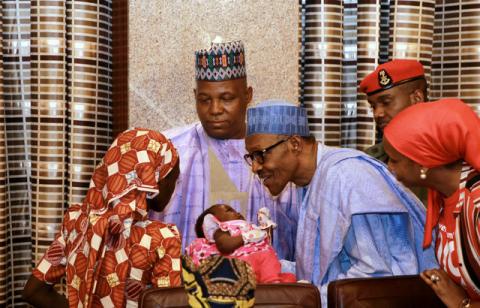Advertisement
Nigeria will do what it can to rescue remaining Chibok girls, Buhari says
ABUJA, Nigeria (Reuters) - Nigeria will do what it can to rescue more than 200 Chibok schoolgirls kidnapped by Boko Haram two years ago in the northeast, President Muhammadu Buhari said on Thursday as he met the first girl who had managed to flee the jihadists.
Soldiers working with a vigilante group found Amina Ali Darsha Nkeki on Tuesday near Damboa, south of Maiduguri in the remote north where Boko Haram has waged a seven-year insurgency to set up an Islamic state. Officials confirmed she was one of 219 girls abducted from the government school in Chibok in April 2014.
"Amina's rescue gives us new hope and offers a unique opportunity to vital information," Buhari said during a meeting with the teenager, her mother and officials after a presidential jet had flown her to Abuja.
He said the government would make it a priority that Amina, who showed Buhari her four-month old baby, can go back to school.
"Nobody in Nigeria should be put through the brutality of forced marriage, every girl has a right to education and their choice of life," he said. "Amina must be able go back to school."
After Amina was discovered the army said it had detained a suspected Boko Haram militant called Mohammed Hayatu, who said he was Amina's husband.
On Thursday the military released pictures of a clean-shaven man in a white shirt and cream slacks sitting beside Amina on a hospital bed holding the infant in his lap.
The governor of Borno state where the town of Chibok is located said army generals were already drawing up plans to rescue her classmates.
"We believe that in the coming weeks we shall recover the rest of the girls," Governor Kashim Shettima told reporters after the meeting in Buhari's office. "The military is already moving into the forest."
Previous military attempts to storm Sambisa have met with mixed success, with soldiers making significant in-roads but failing to finish off Boko Haram after running into bands of well-armed guerrillas, mines and booby traps.
INSURGENCY
Amina, who was accompanied by her mother, Binta, and Nigeria's defense minister and national security adviser, spent more than an hour with Buhari, who made crushing Boko Haram a pillar of his 2015 presidential election campaign.
Buhari, 73, Nigeria's former military ruler, cradled Amina's baby in his arms during the meeting in the lavish presidential villa before posing for a group photograph.
Boko Haram captured 276 girls in their night-time raid on Chibok in April 2014, one of the most audacious and high-profile assaults of a seven-year-old insurgency to set up an Islamic state in northern Nigeria.
More than 15,000 people have been killed and two million displaced in Nigeria and neighboring Chad, Niger and Cameroon.
Some girls escaped in the melee but parents of the remaining 219 accused then-President Goodluck Jonathan of not doing enough to find their daughters, whose disappearance led to a wave of global outrage.
The #Bringbackourgirls activist group said Amina had told her rescuers the rest of the girls were under heavy Boko Haram guard in Sambisa.
Amina's mother last year spoke of her daughter's fear of Boko Haram but of her joy at attending school.
She told the Murtala Muhammed Foundation, a Nigerian non-profit organization researching a book on the Chibok girls, that she was not sure of the age of Amina, the youngest of her 13 children although only three survived their early years.
"She always sewed her own clothes," her mother said in the interview released to the Thomson Reuters Foundation by Aisha Oyebode of the Murtala Muhammed Foundation.
Binta said Amina's father died some months after his daughter was abducted.
"After Amina was kidnapped, only two (of our children) are left alive," she said, adding that her son and daughter lived in Lagos.
She said she had constantly thought of her lost daughter, who had used to help her around the house.
"(My son) said I should take it easy and stop crying," she told the Foundation. "He reminded me that I am not the only parent who lost a child."
(Reporting by Lanre Ola, Ulf Laessing, Felix Onuah and Afolabi Sotunde; Editing by Ed Cropley and Gareth Jones)



















Add new comment